Summer Supper
Learn how Urban Gleaners is feeding hungry people while reducing food waste
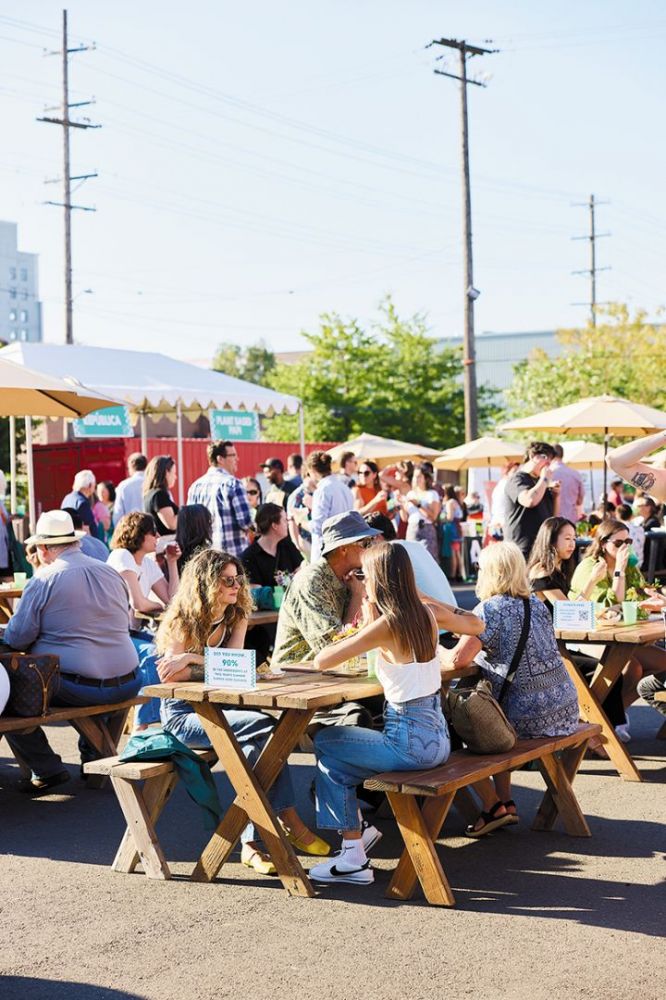
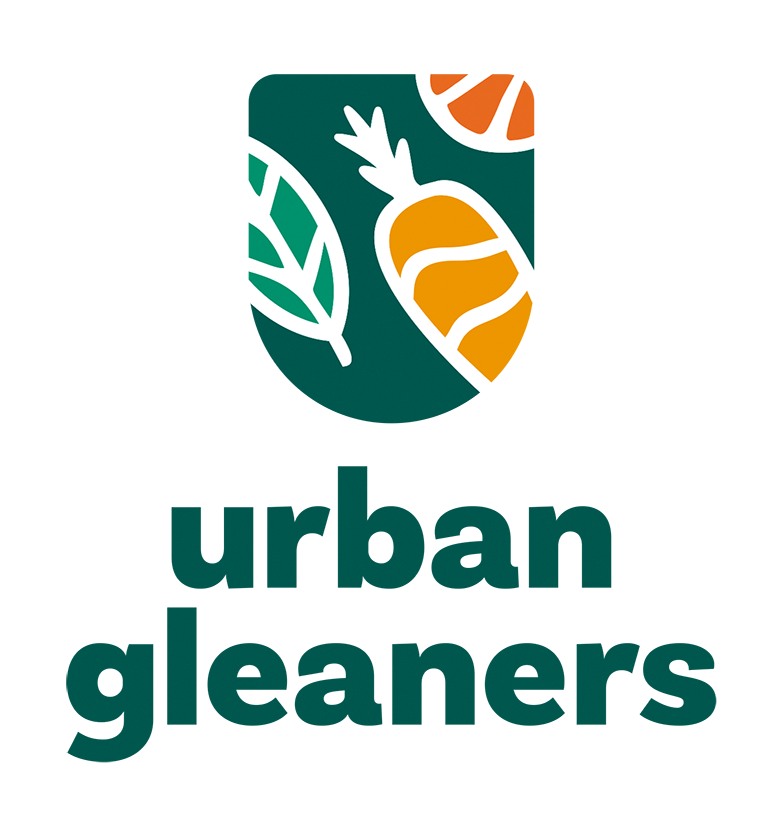
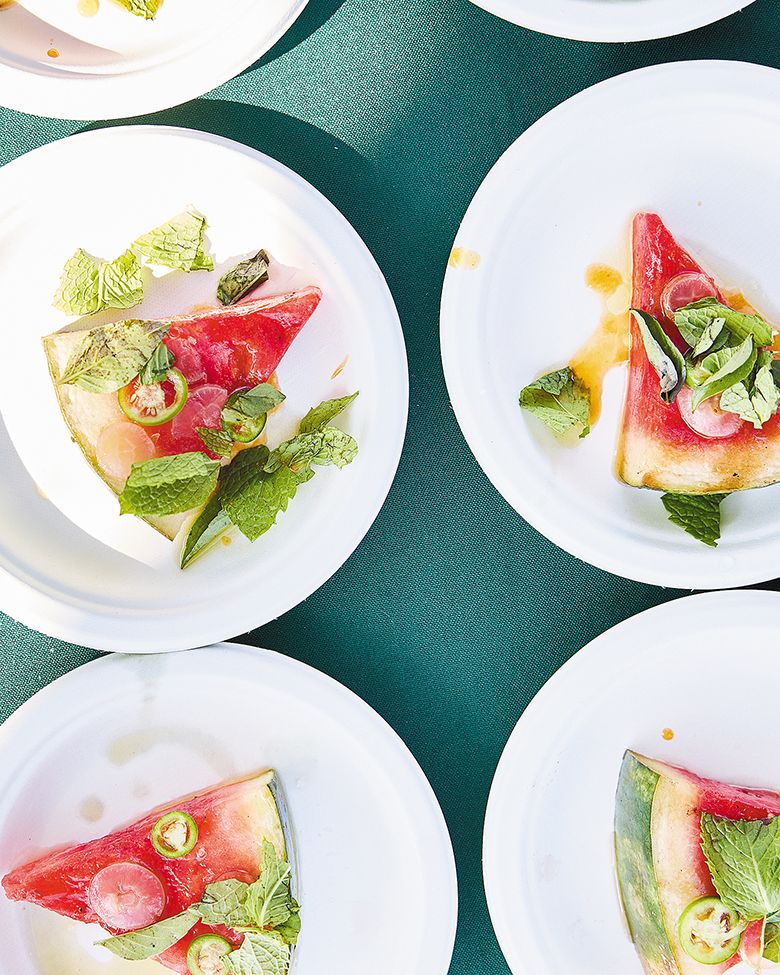
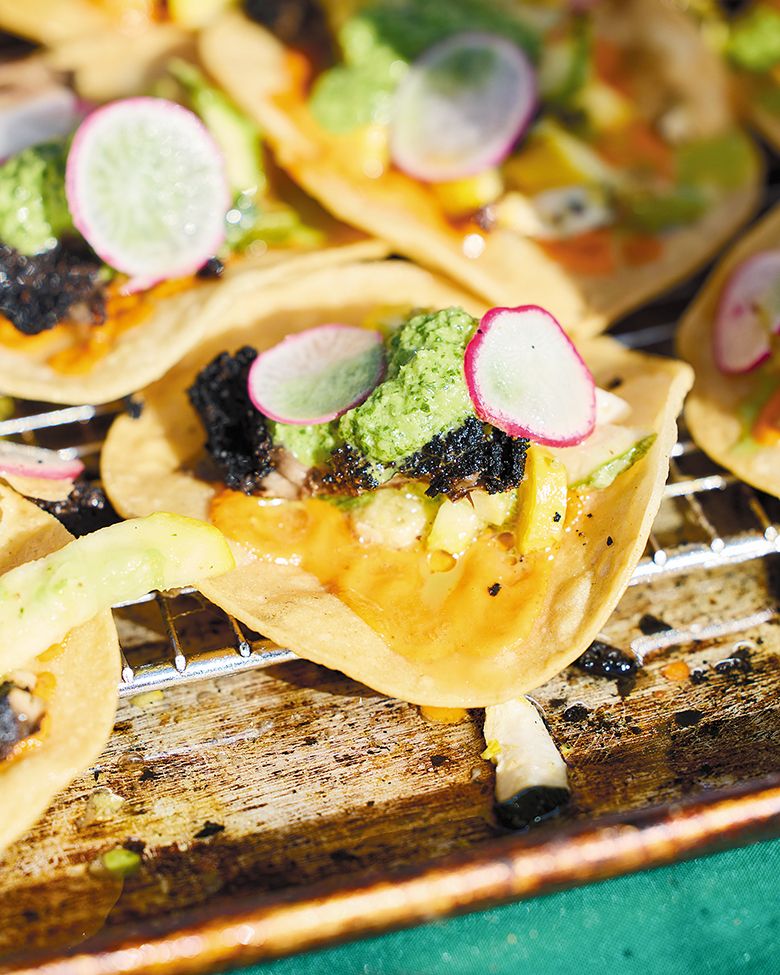
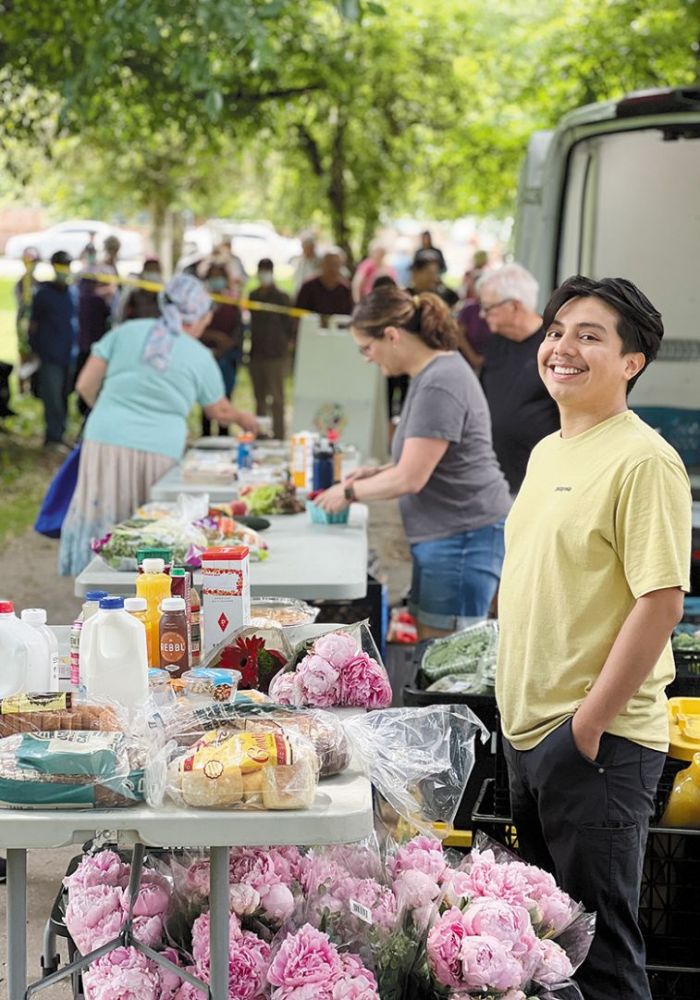
By Annelise Kelly
It’s a mild, sunny day at Mt. Scott Park in Southeast Portland. A white van backs up the paved path. As it parks, we spring into action. I’m one of four volunteers assisting Lizz Marks, an Urban Gleaner community outreach coordinator, in assembling canopies over folding tables. Several early customers lend a hand as we unload bins and crates. Within 45 minutes, we’re ready.
This is one of Urban Gleaners’ year-round free markets, where all are welcome to fill a bag with a wide variety of donated food. At the first table, shoppers find prepared foods and meats– grab-and-go wraps and sandwiches, soup, salsa, pasta sauce, pizza dough, prepared salads and complete, ready-to-heat meals.
Also offered: fresh or frozen meat, poultry and fish. A second table has shelf-stable offerings including canned goods, snacks and drinks, as well as dairy products. Tables three and four contain breads, desserts, fruits and vegetables.
RESCUING FOOD
Since 2006, Urban Gleaners has been dedicated to three interconnected goals: improving food access, reducing food waste and cutting the large volumes of methane gas generated when food decomposes in landfills. The organization collaborates with grocery stores, restaurants, corporate campuses, farmers markets, event sites, colleges and universities, farms and food wholesalers. Partners include grocery stores (Zupan’s Market, New Seasons Market, Trader Joe’s and Whole Foods Market), distributors (Imperfect Produce and Organically Grown Company) and company cafeterias (Intel and Nike).
Urban Gleaners distributes food at more than 40 free markets across Multnomah and Washington counties. Mt. Scott Park, Lents Park and Woodlawn Park are run entirely by staff and volunteers. Other markets are organized by schools, community centers and organizations, including Outside In and the East County Food Pantry.
By the vanload, Urban Gleaners is making a difference. According to its annual report, in 2023, the organization:
• Diverted more than 1.15 million pounds of food from the waste stream
• Diverted over 100,000 pounds of methane
• Distributed nearly $6 million worth of food at 42 free food markets
• Accepted food donations from 185 unique partners
• Distributed food to 91 different schools and organizations
This was accomplished by 15 staff members and 77 volunteers who donated more than 2,100 hours sorting and repacking, running weekly pickup routes, farm gleaning and supporting park markets.
The Urban Gleaners’ website states it “strives to eliminate all barriers to accessing nourishing food to ultimately create a resilient system that celebrates food as a fundamental right in a just society.”
One way they remove obstacles is by welcoming everyone with zero screening.
“A lot of people who need food assistance have a lot of other things going on in their lives,” explains executive director Nico Niebes. “They may be applying for SNAP benefits or trying to get rental assistance or have medical bills to pay– forcing them to decide between different priorities. Accessing food relief is often difficult, requiring ID or proof of income. Urban Gleaners doesn’t have any requirements. We strive to make the entire experience as close to shopping for the food you want as we can.”
She notes how pre-selected food boxes can also contribute to waste when they contain items the recipient can’t or won’t eat. “Allowing folks to choose what they want to eat that week or even tonight is really impactful. We’re treating people with dignity and trust.”
CULINARY UPCYCLING
While most donated food is distributed as-received or repacked in new containers, “culinary upcycling” is another approach used by Urban Gleaners. Head chef Jason Howd leads a small team in the organization’s commercial kitchen, turning ingredients into complete heat-and-eat meals, ensuring people lacking time, tools or ability to cook still have nourishing options.
This culinary alchemy plays a significant role in Urban Gleaners’ outreach and fundraising. Historically, they hosted a gala-style fundraiser serving 175 people with gourmet fare made from donated ingredients. This year, they are collaborating with local chefs in a supper series featuring a multi-course meal served family-style, for 35 to 40 guests.
The first feast, in early April, was crafted by chefs Sam Smith of Yaowarat and Xiao Ye’s Louis Lin. Seated at two long tables under twinkling fairy lights, guests were abundantly plied with nine passed dishes. The meal began with appetizers– crispy five-spice pork from Smith and Japanese omelet with shrimp and trout roe from Lin– paired with a lemongrass pandan gimlet. Three more courses followed, each paired with wines from Brooks Wine in Amity. Dinner culminated with build-your-own sundaes featuring Salt and Straw’s banana parsnip sherbet, one of five flavors in their 2025 Upcycled Food series.
Urban Gleaners plans to reach even more people during its annual Summer Supper on Sept. 15 at The Redd in Portland. Local chefs will transform donated ingredients into delectable small plates for approximately 700 guests. Whistles will be wetted with local beer and wine selections, cocktails, sparkling mocktails and other nonalcoholic options. Last year’s event included Salt & Straw’s Tyler Malek and Gregory Gourdet of Kann, both Urban Gleaner board members.
Niebes recalls that while she enjoyed the gala dinner, “we wanted more people to see what we do, so we changed our large summer supper to a festival-style event. A lower ticket price allows more community members to be fully immersed in our mission. The chefs explain what they’re creating and how they did it. Get ready to be inspired in your own house and reduce your own food waste.”
Many participating chefs bring surplus food to Urban Gleaners for redistribution. “They are aware of food insecurity in our city and their involvement shows how much they care– to help us and others,” notes Niebes.
FREE MARKETS IN THE PARKS
Back at the Mt. Scott Park market, an eager, orderly crowd files past the tables. One at a time, shoppers can choose a specific number of items from each category. They may be single or have large families, committed cooks or prefer pre-made food, gluten-free or vegetarian. There is something for everyone. Shoppers represent a wide range of ages, languages and cultures.
A few weeks at the fruit-and-veggie table revealed who covets sweet potatoes or craves grapefruit. I’ve learned who has a large family, lives in their car, has ducks or a garden at home. Some market guests arrive early to help unload the van, while others like to linger and chat. Many treat it as a social event. There’s ample time for conversations– it may be the perfect place to meet your neighbors or someone who speaks your language.
The volunteer at the bread-and-desserts table lives nearby. “I was walking through the park, late in the pandemic and saw Urban Gleaners here,” says Darlene Chirman. “I thought, well, that’s something I would like to do. I enjoy volunteering, giving back. This allows me to interact with my neighbors rather than working in a warehouse or something like that. I see many of the same people every week and learn their stories. We support those facing financial hardship by making sure they have good food to eat. But it also keeps nearly expired food out of the landfill and makes good use of it.”
Urban Gleaners' Summer Supper
September 14, 5-8 p.m.
831 S.E. Salmon St., Portland
Tickets: $100-150
www.urbangleaners.org
After living in Denmark, the Netherlands, L.A. and the Bay Area, writer Annelise Kelly settled in Portland, where she delights in food carts, Douglas firs, dancing and getting crafty. Thanks to Annelise’s broad interests, her career path has weaved through cooking, events, technical writing, decorative painting and retail display. Wanderlust takes her across borders and oceans every chance she gets. Connect with Annelise at www.annelisekelly.com.










